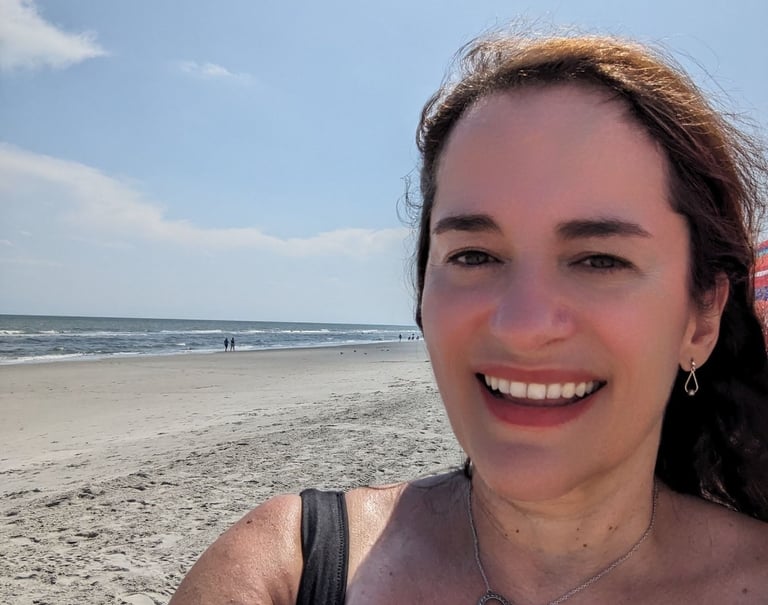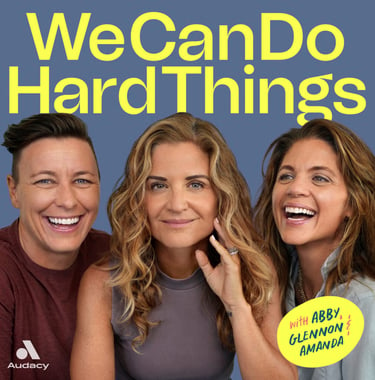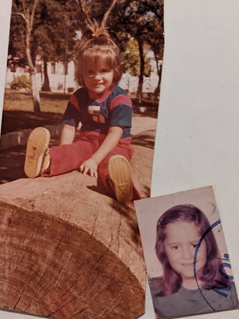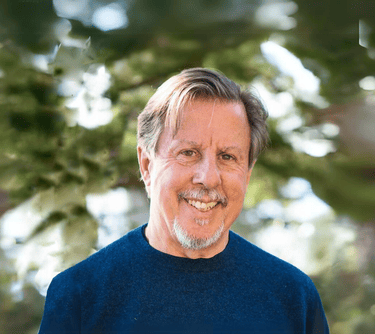How I finally learned to love myself and make peace with my inner critic
This was my biggest mountain to climb ever since I became aware of my inner child wounds and self-limiting beliefs. This year, I climbed it.
BECOMING YOURSELF
Fernanda
12/10/20247 min read


2024: my year of healing, growth, and finding myself
2024 has been a transformative year for me. I'm grateful to all the negative things that happened to me this year. I'm grateful because those negative things led me on a path of self-discovery self-love self-acceptance and self-compassion. I am a completely different Fernanda at the end of 2024 then what I was at the beginning of 2024. The majority of those changes are internal mental changes. However some of those changes have also manifested themselves physically for me. And I'm grateful for that too.
What happened?
I found myself on a learning journey after having an emotional breakdown at work in mid-March. What caused the episode isn't important. What's important is what happened after the episode. When I was describing the episode to my therapist, she asked me to identify what I was feeling the moment of my breakdown and where in body was I feeling it. In that moment, I felt the sensation all over again, and it was in my neck.
My therapist said that feeling in my neck was likely shame. She had me tell her what I was thinking when I was feeling that shame. I told her I had a voice inside me that was recriminating myself for letting myself lose emotional control like that at work. And very casually as my therapist tends to be, she said:
"you know Fernanda, I think you have a very very strong inner critic. You are way too hard on yourself. Have you tried doing affirmations?"
I kind of laughed and told her "I'm the queen of affirmations!" Because a year earlier I had read a book called "What to Say When You Talk to Yourself" (awesome book), and I had Incorporated the practice of daily affirmations into my life. Then my therapist said:
"I wonder how many of those affirmations you actually believe in?"
That statement left me temporarily speechless. I had never contemplated the fact that maybe I didn't believe the affirmations I had written for myself. Next, my therapist (thank you universe for sending me to her!) recommended: "you might want to look into IFS" .
When the student is ready, the teacher appears
At the time I had heard of IFS but I had not really looked into it. After that episode, I was listening to some podcasts and I fell into the wonderful rabbit-hole of self-acceptance and self-compassion. I was lucky to have been listening to the right podcast at the right time. I was listening to the "We can do hard things" podcast with Glennon Doyle and Abby Wombach. They had a guest on the show called Richard Schwartz (he goes by Dick). Dick is the founder of IFS (Internal Family Systems). In that episode, He offered to interview the hosts of the episode in the IFS therapy modality that he developed and teaches.
I listened to each of the hosts going through the experience of discovering what's bothering them on the inside by by following Dicks methodology. And with them, I started to learn to learn this way to self-investigate. It was an awesome learning and I am so grateful that I was listening to that podcast at that time.
This was in early April. After listening to that episode, I completely "nerded out" on content about IFS, self-compassion and healing. I listened to multiple other episodes of Dick Schwartz interviewing podcast hosts using the IFS modality to uncover their parts.
Dick teaches that we all have parts inside of us that are there to serve a purpose or a function. Some parts are acting as critics, other as protectors, others as firefighters. Those parts are typically trying to protect younger parts: exiles: those parts that are hidden deep inside us, that got stuck in time due to emotional trauma that we suffered (more often than not) in our early childhood years. As I listened to him helping others discover more about their parts, and engaging with their parts in a compassionate, curious and loving way, I started to wonder about my parts.
The power of Journaling
I've kept a journaling practice for years. Journaling has always been helpful for me. I typically do a prompted journal entry in which I ask myself the same 4 questions every time (more on that on another blog post). With this new discovery about IFS and self-compassion, I decided to dive into myself via my journal, but using the typical prompts I had heard on the IFS interviews. I was ready. My mind and heart were open. I faced little to no resistance from my parts as I sought to identify them, get to know them, listen to them, comfort them, tell them that I am here, and that I can love them the way they wanted to be loved but weren't by others.
This was when I talked to my inner critics (there are more than one!). I didn't tell them they were wrong or tried to change them. Instead, i sought to understand them, to discover what was driving them to be so critical. Once they told me, I validated them, told them I understood why they thought that being critical was necessary, given their situation at the time. I told them I'm OK now. They did a good job of trying to protect me. They don't need to work so hard anymore. After they accepted this, we worked on a plan for what they'd like to do instead.
I cried. I cried A LOT. This process was incredibly cathartic. Every time I did an IFS journalling exercise, I would cry, write, and come out feeling physically and emotionally lighter. IFS gave me the tools, the vocabulary, and the understanding I needed to uncover my inner child wounds and to actually heal them, something I thought I'd never be able to do.
While doing this work, I also consumed other content related to these concepts of self-love, self-compassion, self-acceptance and self-forgiveness. I took what I could from all those sources and incorporated those learnings into my healing journey. One very special book thru which I did more journalling exercises was "How we heal" by Alex Elle *. She helped me forgive my younger self by writing a letter to her. Another cry-fest for me, but I'm so glad I did it.
*that's an affiliate link for Bookshop.org.- a purchase may generate a small reward for me


EMDR
Back at therapy a couple of weeks later, I had made A LOT of progress. My therapist was surprised. I was able to tell her about all the parts I had Identified doing my own self-investigation, and about how I uncovered hidden memories that had caused the emotional trauma that caused the little versions of myself to get stuck in time and that would get emotionally triggered every now and then.
As we delved deeper into those traumas, my therapist asked if I'd be interested in doing EMDR with her. I had only vaguely heard about this before. She explained that EMDR (Eye Movement Desensitization and Reprocessing) is a technique that helps us work though trauma, self limiting beliefs and change those beliefs. Since I was already engaged in this process of healing my emotional traumas, of course I signed up for it! we did the necessary preparations and scheduled the session.
A couple of weeks later, we did an EMDR session for 1 hour and 10 minutes in which we addressed my two strongest negative beliefs about myself. She asked me to find core memories that had established those beliefs. One of them was easy to associate, and the other took more digging. Once that was established, she had me hold onto this little machine that would vibrate from either side (there were pieces I was holding with my two hands) and I had to close my eyes and think about the negative belief. She would stop every now and then and ask me, on a scale of 0 to 10, how true I thought the belief was. It took me about half a session to get to a point where the first belief simply wasn't true anymore. In fact, I now believe the opposite of that negative belief. Then we repeated the process for the second belief.
It sounds crazy to say that I was able to tackle and revert my top self-limiting beliefs in 70 minutes, but that's exactly what happened.
I think the reason EMDR worked so quickly for me is because I had already done all that IFS work and I was ready, open and prepped. I imagine it might not be as quick and effective with other types of trauma, or it might take more sessions, etc. Nevertheless, It helped me, and I want to share my experience in case it helps anyone else.
Moral of the story
Thank you, emotional breakdown from March 2024! You were the catalyst I needed to dive deep into myself and take on this healing. It took courage, vulnerability, and lots of tears, but this work was so incredibly valuable to me. It helped me become a more loving, compassionate, and forgiving person to myself and others. It helped me forgive myself for the ways I behaved in the past, even as an adult in my 20s and 30s. It helped me become a better partner, mother and friend. It opened up my creativity and propelled me to pursue this project with Filled Cups.
If you struggle with self-criticism, perfectionism, if people tell you "you're too hard on yourself", I am here to tell you that there is a way to heal yourself, and that practicing self-compassion is the way. I hope sharing my experience from this year has been helpful to you. If you are interested in doing this kind of self deep-dive, I recommend working with a therapist to help support and guide you through this journey.
with love,


One thing that helped was to look at pictures of myself as a young child as I was having those memories and addressing my exiles. Look at that adorable little face! She just wanted love, attention, and nurturing. She deserved to be loved and nurtured in the purest of ways. I know she felt she didn't get that at that age, but I am choosing to give her that love now.




Connecting individuals through meaningful relationships and valuable resources.
connect
Newsletter
Subscribe to our newsletter for valuable insights and helpful content.
© 2026. Filled Cups. All Rights Reserved.
INSPIRATION
